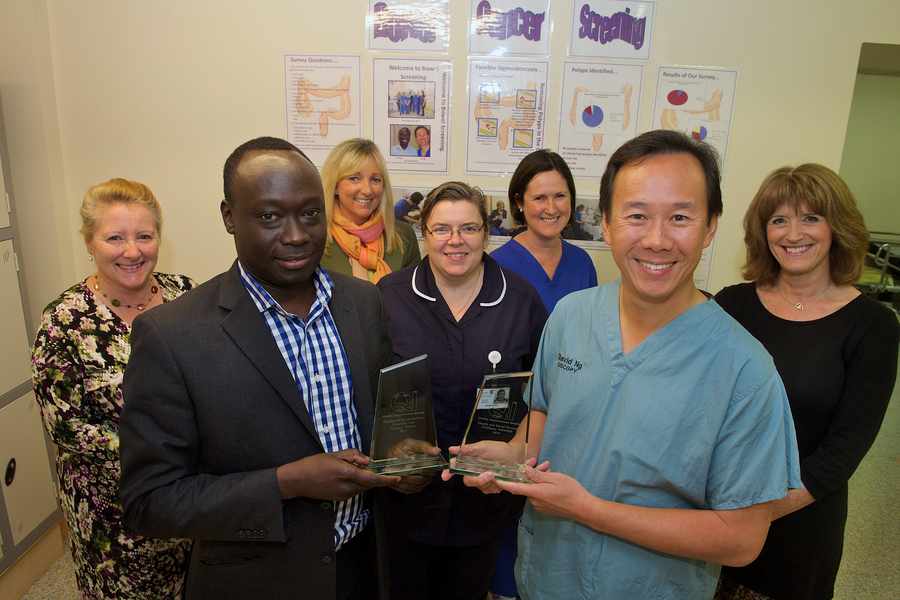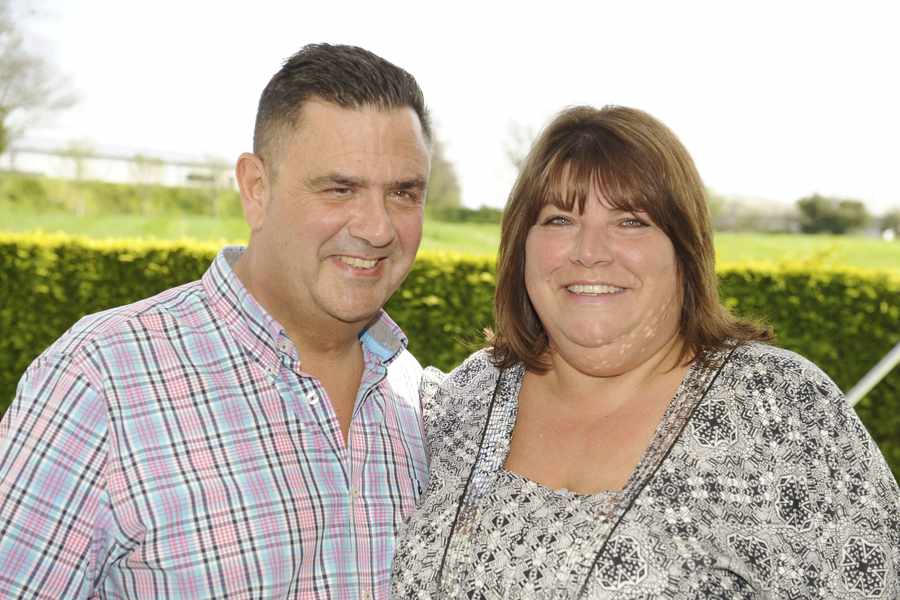- Third of people eligible for free bowel cancer screening not taking up the offer
- Bowel cancer is the third most common cause of cancer in Jersey
- Interview with Islander who has overcome bowel cancer below
- Comment: Having a colonoscopy could save your life
ONE third of Islanders who are eligible to be screened for bowel cancer are putting their lives at risk by not taking up the offer, says a Hospital consultant.
Bowel cancer is the third most common cause of cancer in Jersey, with an average of 55 new cases diagnosed per year.
In 2013 the Hospital rolled out a screening scheme which invites all 60-year-old Islanders – around 1,000 people a year – to undergo a 15 minute examination.
- Colorectal (bowel) cancer is the third most common cause of cancer in Jersey.
- An average of 55 new cases are diagnosed each year.
- Nine out of ten cases of bowel cancer can be treated successfully if diagnosed early.
- Survival after one year from colorectal cancer has been increasing locally, with a five-year survival for women at 78%.
- For men, the five-year survival rate has increased from 72% a decade ago to 82%.
- About one in 20 people will develop bowel cancer in their lifetime.
But one in three Islanders who are offered the potentially life-saving test do not take up the opportunity.
Today, as part of Bowel Cancer Awareness month, consultant gastroenterologist Dr David Ng urged Islanders not to be embarrassed to have the vital examination and warned that 95 per cent of people who are diagnosed with advanced stage bowel cancer die within five years.
However, he added nine out of ten cases of bowel cancer can be treated successfully if diagnosed early.
Dr Ng, who works alongside Dr Moses Duku, said: ‘It’s a relatively painless examination that takes about 15 minutes. It could save your life.’
The test, using a narrow telescopic instrument called a flexisig, examines the bowel and detects any growths known as polyps, which can be removed and examined to see if they are cancerous.
Since the scheme was introduced five Islanders have had cancerous cells detected and have undergone life-saving treatment.
Meanwhile, Islanders are also asked to be on the look out for early warning signs of bowel cancer through a Health Department Don’t Rush to Flush Campaign.
Dr Ng said: ‘It’s important that you get to know what bowel habits are normal for you so you can spot any changes.
- Jerseys bowel screening programme is offered to people during their 60th year.
- The screening does not involve a full colonoscopy, rather it is a test called a flexible sigmoidoscopy (known as flexi-sig).
- If you are not eligible for screening, you can still help to reduce your risk by making changes to your lifestyle.
- For early signs of bowel cancer and how to make lifestyle changes, see www.gov.je/health
‘A change in bowel habit lasting for three weeks or more, especially to looser or runny poo, needs to be checked by a doctor.
‘Other symptoms to check for are any signs of bleeding from your bottom and/or blood in your poo, unexplained weight loss, extreme tiredness for no obvious reason or a pain or lump in your tummy.’
He urged anyone with these symptoms to visit their GP as soon as possible.
As part of the campaign, representatives from the Health Department handed out free toilet rolls on King Street on Saturday with wrapping that describes the signs and symptoms of bowel cancer.


ROGER Baudin says it is down to the ‘brilliant’ medical care from Jersey doctors, along with focusing on seeing his son’s graduation, that he is now on the mend after being diagnosed with bowel cancer last January.
The 55-year-old upholsterer who is married to Sonia (48) and father to Aaron (23) had at first dismissed the symptoms he had suffered as something ‘silly’ but when he suffered a major bleed on 27 December 2013 he knew something was ‘really wrong’ and went to accident and emergency.
He was admitted to hospital and following a series of tests Mr Baudin was told he had bowel cancer on 9 January.
The 55-year-old from Trinity said: ‘It’s one of those things. I had noticed some symptoms but put them to the back of my head.
‘I had heard about bowel cancer. I know it sounds weird but you don’t think it’s ever going to happen to you.
‘The first thing I thought about was that my son was going to graduate later in the year and I wanted to be there.
‘That made me quite strong and focussed.’
Mr Baudin underwent chemotherapy in Jersey before having chemotherapy and radiotherapy at Bupa’s Spire Hospital in Southampton.
Following an eight week break from treatment Mr Baudin underwent a ten-hour operation to have the tumour removed at Jersey Hospital by surgeon, Mr Miklos Kassai on 5 September last year.
Mr Baudin was fitted with a temporary ileostomy bag, which collects intestinal waste, but this was reversed in November.
And although medics have told him it will take him up to a year to fully recover he says he is now ‘living life to the full’.
And he had this message for Islanders: ‘Embarrassment is easy to get over. My advice is to get any worries checked out. Life is too short.’

The JEP’s Caroline Moody on an embarrassing, but potentially life-saving procedure
I AM going to tell you something that I have not even told my mother.
After all, this is not the kind of thing you go around telling your friends and colleagues. But on hearing one person in the office being a little more candid than I had been, I admitted that I had had a certain medical procedure.
Suddenly it was like I was part of the club … Oh well, you know so and so and so and so have all had it done. What took you so long to join us?
I am not one for hospitals, having personal experience only of the maternity wards. But the welcome on the ward was warm and friendly. I couldn’t help but feel that the staff were particularly keen on making you feel like this was going to be the most normal thing in the world. I was chuffed because I got a bed by the window on a bright sunny morning, and I was happy that I had remembered to bring a good book. I turned to page one. Slowly the other beds were taken by three ladies, none of whom looked as anxious as I felt. Any conversation with nurses was hushed. I gleaned that one woman had had this process before and that she had survived cancer. The importance of the exploratory check up seemed to be underlined.
I tried to concentrate on my book. The first lady was advised to ‘gown up’ and away she went. Another was invited in the other direction, clearly having a different procedure. The first lady returned, lying on her bed, curled in a loose foetal position as though she didn’t really want to move just yet, thank you.
Eventually – some three hours later – I was told that I could gown up. I changed into some rather fetching disposable cut off blue shorts which had an opening at the rear. I walked to my destination, my hands clasped behind me, ‘minding the gap’.
Don’t ever let anyone tell you that a colonoscopy is easy. The long and short of it is that it is not the most natural thing in the world to be having a camera shoved up your bottom. But actually, the most difficult part of the procedure is the preparation. You start a couple of days before by restricting foods to plain things – no fibre, no fizzy drinks. Actually, having repeated the process in January, it really does make for a good new year detox. I didn’t know I had it in me to go without food for so long. The worst day is the day before the procedure – no food after 9 am which, if you have breakfast before going to work, as I did, effectively means no food after 7 am.
The real fun starts at about 5 pm the day before your procedure. You need to have nothing planned that evening, not even an idea that you will enjoy your favourite halfhour soap. Because you are going to be interrupted. About 38 times. At least, that’s what it feels like. I lost count after 12. ‘Moviprep’ might sound like something you would do before going to the cinema, but it is in fact an industrial strength ground shaking laxative. It tastes OK (lemony) and is surprisingly easy to drink – until, that is, you have to swallow the last half of the second litre, by which time you don’t think you can take any more, especially as your stomach is swirling with an additional litre of water.
Once you start, you don’t stop. Not for about four hours. It was mildly amusing at first, and downright exhausting by the end. By late evening, the liquid is exiting your body almost as quickly as it goes in, and has much the same colour and consistency. When the instructions say you need to be close to a toilet, they are not joking. Resistance is futile. It does stop, however, just in time for bed. But morning comes too soon, for you know what’s coming. Before you know it, you find yourself in a hospital theatre lying on your side, with those shorts feeling more than a little inadequate to cover your derrière.
Would I like a sedative? Damn, yes. In fact, make it a double. Bottoms up and all that. Insertion (the camera, not the sedative) does not hurt, but I was bothered by the instrument (I didn’t look to see its size) that caused me discomfort the further up each twist and turn of the bowel. The sedative was topped up and a second doctor was called for help. Great, someone else to enjoy the view. Why would anyone want to choose this as a career? After a couple of years in medical school do they suddenly realise they have an interest in colons and rectums? Is it because they don’t like feet, or breasts, or brains? Mr M, who worked in Health, said that he knows people who say, yes, actually, it is just another part of the body. He reckons the staff enjoy the contact with the patients, the technical side of the job, and the huge satisfaction of being able to diagnose treatable conditions that may have otherwise eventually killed the patient.
Anyway, soon it was over, I was back in the ward and eating the first solid food for 29 hours. It is without doubt the best tea and sandwiches you will ever have. So had it all been worth it? A combination of events had brought me here, and my doctor had deemed it sufficient to have a check-up. The answer is a wholehearted yes. As part of the procedure, the doctor had there and then painlessly cut out two polyps. It turns out that the larger of the two was pedunculated (how I enjoy learning new words) – think ‘grape on a stalk’. I looked it up. I also read that polyps, commonly less than a centimetre across, are not usually cancerous, but some, left unchecked, will eventually turn into cancer, so they are always removed.
It was only three months later, when I had to repeat the process for a check-up, that I discovered that mine was indeed not sinister, but it had been 2.5 cm across. Quite shocking to think it could have carried on growing without my noticing (there being no other obvious symptoms) had it not been for a routine hospital procedure. In the same way that the TV programme Embarrassing Bodies attempts to take away some of the embarrassment of talking about what happens to our bodies, I share this experience with you because if it makes just one person go for the check-up that they have been putting off for months, then it will be worth it. Of course Mr M had, in his own inimitable way, tried to be helpful. He told me about his nurse friend Gabriel who worked in endoscopy – who was known as ‘the arse angel Gabriel’. It’s an old hospital joke, apparently, but I hope that if you are due your first colonoscopy soon, you will think of it when you are lying there feeling somewhat exposed and/or embarrassed.
For 24 hours, don’t, whatever you do, lose your sense of humour.






